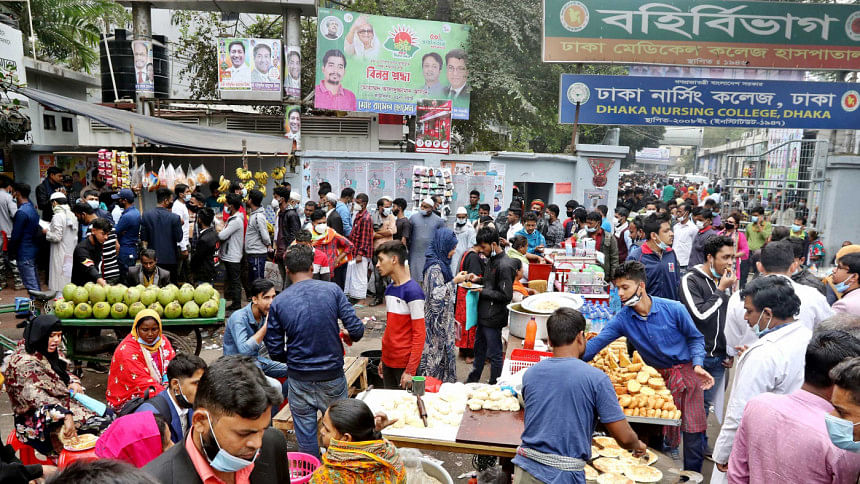We must be rational in fighting the new Covid wave

In view of the surging Covid-19 cases across Bangladesh, the government issued new sets of guidelines earlier this week to curb the spread of the virus. The directives that were issued on January 21, 2022 directed the closure of educational institutions for two weeks—from January 21 to February 6. It also said that any event—government, religious, social or political—should not allow more than 100 people to attend, and even those attending must produce their vaccine card or PCR test results, not older than 24 hours prior to the event. Individuals working in various offices and factories must have their vaccine certificates, and the guidelines also made mask wearing mandatory in all public places, including shopping malls, bus stands, launch terminals, mosques, etc.
However, how effective these new set of directives will be in containing the new wave of the pandemic needs thorough scrutiny.
If one takes a closer look at the three set of guidelines the government issued on January 10, January 21, and January 23, respectively, covering 17 rules in total, one would see that significant emphasis has been attached to social distancing measures and Covid hygiene practices. Looking at these, one can safely assume that perhaps the end objective of issuing these guidelines is to fight the pandemic through social distancing in public spaces and adherence to the best Covid-19 hygiene practices.
However, while the initial 15 guidelines issued on January 10 and another one issued on January 23 had been well contemplated, the five directives issued on January 21 could perhaps be better thought out—especially the one regarding the closure of educational institutions.
To start with, while in-person classes in schools and colleges have been suspended for two weeks to lower the risk of infection among students, the children remain exposed to high-density public gatherings, as multiple fairs are taking place across the country: the Dhaka International Trade Fair (DITF), for one.
A video by this daily of the Police Women Welfare Association (Punak) fair in Lalmonirhat, which began on January 12, shows the unhealthy gathering of people at the fair premises. And the crowd invariably included children. On January 19, Lalmonirhat, along with nine other districts, were marked as Red Zones by the health authorities. The average infection rate in these districts is more than 10 percent. Given the situation, the Punak fair was suspended on January 23.
The scene is similar at the DITF, but it is still going on.
When asked by the media about the effectiveness of closing down the educational institutions to lower the risk of infections among children, the education minister said, "Effectiveness depends on everyone maintaining the hygiene rules." If that is the case, the parents who are taking these children to these fairs are not following hygiene rules.
And not just these fairs, the children are being taken out to attend weddings—this being the "wedding season"—and parties, shopping malls and hangouts. When this is happening, how the two-week school closure alone would help prevent the spread of the virus among the students, one might be pardoned for asking.
In addition to this, the decision to allow the fairs to continue and the shopping malls to run like business as usual, while restricting the number of people who could attend events, also does not make much sense. So many people visit these fairs every day, and so many people visit shopping malls every day, so why this curb on events only? If the government's objective is to prevent public gathering, then they must come up with a holistic strategy to discourage people from congregating in one place. This should include fairs, shopping malls, airports—especially the one in Dhaka, which is turning into a breeding ground for the virus, given the 16-hour packed flight schedule and the lacklustre enforcement of social distancing rules—and other places where people might gather.
The government's U-turn to allow buses and launches to operate in full capacity, despite previously instructing them to run in half capacity that came with the set of 11 guidelines issued on January 10, also does not help in enforcing social distancing in public. Under the pressure from various actors in the transport sector, the authorities allowed public transports to operate in full capacity, meaning people are now being forced to commute in cramped public buses and water vessels.
If containing the infections through enforcement of social distancing and adherence to basic Covid hygiene is the objective, then the government needs to adopt a strategic way forward that will facilitate achieving this, not the contrary.
Also the authorities must realise that piece-meal measures and knee-jerk reactions such as closing down in-person classes, while still leaving the children vulnerable to exposure at public gatherings, would not help in keeping them safe. Nor would it help if their parents keep commuting in cramped public transports, potentially exposed to the virus. The same goes for restricting the number of people at events only.
The government must take a hard look at the measures taken so far, and its strategic plan to battle the new wave—if it has one in the first place—and take a rational and comprehensive approach that would yield effective results. Half-hearted, hasty measures will only increase public sufferings, which will not be a palatable outcome for any party involved.
Tasneem Tayeb is a columnist for The Daily Star. Her Twitter handle is @tasneem_tayeb

 For all latest news, follow The Daily Star's Google News channel.
For all latest news, follow The Daily Star's Google News channel. 



Comments